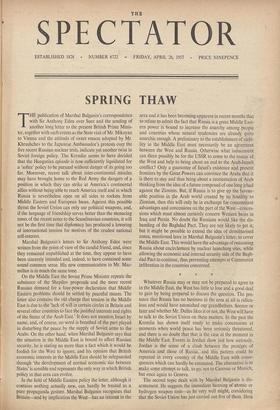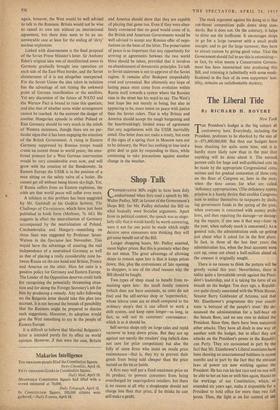SPRING THAW
THE publication of Marshal Bulganin's correspondence with Sir Anthony Eden over Suez and the sending of another long letter to the present British Prime Minis- ter, together with such events as the State visit of Mr. Mikoyan to Vienna and the attitude of sweet reason adopted by Mr. Khrushchev to the Japanese Ambassador's protests over the five recent Russian nuclear tests, indicate yet another twist in Soviet foreign policy. The Kremlin seems to have decided that the Hungarian episode is now sufficiently liquidated for a 'softer' policy to be pursued without danger of its going too far. Moreover, recent talk about inter-continental missiles may have brought home to the Red Army the dangers of a position in which they can strike at America's continental allies without being able to reach America itself and in which Russia is nevertheless open on all sides to rockets from Middle Eastern and European bases. Against this possible threat the Soviet Union can only use political weapons, and, if the language of friendship serves better than the menacing tones of the recent notes to the Scandinavian countries, it will not be the first time that diplomacy has produced a lowering of international tension for motives of the crudest national self-interest.
Marshal Bulganin's letters to Sir Anthony Eden were written from the point of view of the candid friend, and, since they remained unpublished at the time, they appear to have been sincerely intended and, indeed, to have contained some sound common sense. His new communication to Mr. Mac- millan is in much the same tone.
On the Middle East the Soviet Prime Minister repeats the substance of the Shepilov proposals and the more recent Russian demand for a four-power declaration that Middle Eastern problems should be settled by peaceful means. The letter also contains the old charge that tension in the Middle East is due to the 'lack of will in certain circles in Britain and several other countries to face the justified interests and rights of the States of the Arab East.' It does not mention Israel by name, and, of course, no word is breathed of the part played in disturbing the peace by the supply of Soviet arms to the Arabs. On the other hand, when Marshal Bulganin says that the situation in the Middle East is bound to affect Russian security, he is stating no more than a fact which it would be foolish for the West to ignore, and his opinion that British economic interests in the Middle East should be safeguarded through 'the development of normal economic ties between States' is sensible and represents the only way in which British policy in .that area can evolve.
In the field of Middle Eastern policy the letter, although it contains nothing actually new, can hardly be treated as a pure propaganda gesture. Marshal Bulganin recognises that Britain—and by implication the West—has an interest in the area and it has been becoming apparent in recent months that to refuse to admit the fact that Russia is a great Middle East- ern power is bound to increase the anarchy among people and countries whose natural tendencies are already quite anarchic enough. A preliminary to the establishment of stabi- lity in the 'Middle East must necessarily be an agreement between the West and Russia. Otherwise what inducement can there possibly be for the USSR to come to the rescue of the West and help to bring about an end to the Arab-Israeli conflict? Only a guarantee of Israel's existence and present frontiers by the Great Powers can convince the Arabs that it is there to stay and thus bring about a reorientation of Arab thinking from the idea of a future composed of one long jeliad against the Zionists. But, if Russia is to give up the favour- able position in the Arab world created by its hostility to Zionism, then this will only be in exchange for concomitant advantages and concessions on the part of the West—conces- sions which must almost certainly concern Western bases in Iraq and Persia. No doubt the Russians would like the dis- banding of the Baghdad Pact. They are not likely to set it; but it might be possible to extend the idea of demilitarised zones, mentioned later in Marshal Bulganin's letter, to cover the Middle East. This would have the advantage of reassuring Russia about encirclement by nuclear launching sites, while allowing the economic and internal security side of the Bagh- dad Pact to continue, thus preventing attempts at Communist infiltration in the countries concerned.
Whatever Russia may or may not be prepared to agree to in the Middle East, the West has little to lose and a good deal to gain by being prepared to discuss the question. The pre- tence that Russia has no business in the area at all is ridicu- lous and would have astonished our grandfathers. Sooner or later and whether Mr. Dulles likes it or not, the West will have to talk to the Soviet Union on these matters. In the past the Kremlin has shown itself ready to make concessions at moments when world peace has been seriously threatened, and there is no doubt that that is the case at the moment in the Middle East. Events in Jordan' show just how seriously. Jordan is the scene of a clash between the protégés of America and those of Russia, and this pattern could be repeated in every country of the Middle East with conse- quences which can hardly.be estimated. The alternative is to make some attempt to talk, to go, not to Canossa or Munich, but once again to Geneva.
The second topic dealt with by Marshal Bulganin is dis- armament. He suggests the immediate banning of atomic or hydrogen weapon tests—as he very well might, considering that the Soviet Union has just carried out five of them. Here
again, however, the West would be well advised to talk to the Russians. Britain would not be wise to cancel its own test without an international agreement, but there does seem to be an un- answerable case at least for the ending of 'dirty' nuclear explosions.
Linked with disarmament is the final proposal of the Soviet Prime Minister's letter. Sir Anthony Eden's original idea was of 'demilitarised zones in Germany gradually brought into operation on each side of the East-West border, and the Soviet disinterment of it is not altogether unexpected.
For the Soviet Union the idea taken in isolation has the advantage of not raising the awkward point of German reunification or the satellites. Yet any discussion of the future of NATO and the Warsaw Pact is bound to raise this question; and also that of whether some wider arrangement cannot be reached. At the moment the danger of another Hungarian episode in either Poland or East Germany should be very much in the minds of Western statesmen, though there are no par- ticular signs that it has been engaging the attention of the British Government. A rising in Eastern Germany suppressed by Russian troops would create an instant threat to world peace; the emo- tional pressure for a West German intervention would be very considerable even now, and will grow with the creation of the Bundeswehr. In Eastern Europe the USSR is in the position of a man sitting on the safety valve of a boiler. He cannot get off without being blown sky-high. Yet, if Russia suffers from an Eastern explosion, the odds are that world peace will suffer even more.
A solution to this problem has been suggested by Mr. Gaitskell in his Godkin lectures, The Challenge of Co-existence, which have just been published in book form (Methuen, 7s. 6d.). He suggests in effect the neutralisation of Germany accompanied by the neutralisation of Poland, Czechoslovakia and Hungary—something on those lines was suggested by Professor Seton- Watson in the Spectator last November. This would have the advantage of assuring the real independence of a neutralised Germany as well as that of placing a really considerable zone be- tween Russia on the one hand and Britain, France and America on the other. Here for once is a positive policy for Germany and Eastern Europe. The Leader of the Opposition deserves credit both for recognising the potentially threatening situa- tion and for doing the Foreign Secretary's job for him by producing a remedy. Any talks following on the Bulganin letter should take this plan into account. It is not beyond the bounds of possibility that the Russians might be prepared to discuss such suggestions. Moreover, its adoption would give the West something to say to the people of Eastern Europe.
It is difficult to believe that Marshal Bulganin's letter is intended purely for its effect on world opinion. However, if that were the case, Britain and America should show that they are capable of playing that game too. Even if they were abso- lutely convinced that no good would come of it, the British and American Governments would be well advised to accept any Russian offer of nego- tiations on the basis of the letter. The preservation of peace is so important that any opportunity for arriving at agreements between the two world blocs should be taken, provided that it involves no abandonment of democratic principles. To talk to Soviet statesmen is not to approve of the Soviet regime. It remains after Budapest unspeakably cruel and tyrannical. But ultimately any hope of lasting peace must come from evolution within Russia itself towards a system where the Russian man in the street has his word to say. The West's best hope lies not merely in being, but also in appearing to be, more intent on peace with justice than the Soviet rulers. That is why Britain and America should accept the tough bargaining and the heartbreakingly limited areas of agreement that any negotiations with the USSR inevitably entail. One letter does not make a treaty, but even if the signs of a spring thaw in Moscow turn out to be delusory, the West has nothing to lose and a great deal to gain by responding to them,_ while continuing to take precautions against another change in the weather.































 Previous page
Previous page